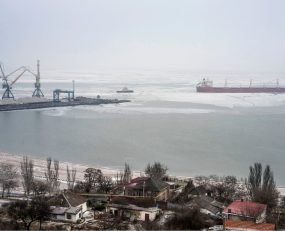
The Russian annexation of the Crimea in 2014 has caused tensions in the region for some time. On November 25, 2018, Russia seized three Ukrainian naval ships and imprisoned 24 Ukrainian soldiers. The blockade of the Kerch Strait started shortly after, leaving two Ukrainian ports in the Azov Sea, Berdyansk and Mariupol, inaccessible. Ukraine saw the incident as antagonistic and western nations condemned the Russian actions and have subsequently imposed sanctions for what is deemed an illegal takeover of the Crimea. The blockade has since eased but Russia is making it increasingly difficult for ships to operate in the Azov Sea.
The Kerch Strait and Azov Sea are strategically and economically significant for both countries. The increased Russian military presence in the region since 2014 has deeply concerned the Ukrainians who oppose the annexation. The construction of the Kerch Strait Bridge, connecting the Crimea to mainland Russia, has become symbol of Russia’s blatant disregard to Ukraine. Not only that, it has disturbed the shipping in and around the Azov, constricting eastern Ukraine.
In the months before the incident in the Azov, Russia began ‘passively’ restricting the imports and exports from the Berdyansk and Mariupol. The low 33m gauge of the bridge has created a barrier to some vessels. This, along with Russia’s prohibition of ships exceeding 160m in length, has stopped over 140 of regular vessels from operating in the Azov Sea – totalling 23% of usual vessels and 43% of cargo tonnage. The disruption of ships by Russian authorities leading to detentions has also become commonplace in the area. Experts have estimated that detention costs the shipowner approximately $15,000 a day, reportedly the average detention time is around five days, but increasing. The threat of such high costs to shipowners has meant diversion from the Azov routes.
The blockade of the Azov is affecting the surrounding economy; trade and industries are starting to suffer. Prices are rising, businesses are struggling, and job uncertainty is high in the port’s local areas. The construction of the bridge has lost Mariupol an annual contract for 1m tonnes for the transportation of pig iron to the U.S. and 350,500 tonnes of steel products for the countries of southeast Asia. The Ukrainian Minister for Infrastructure, Volodymyr Omelyan, said, the Ukrainian maritime sector has lost around UAH10bn (€316m) as a result of the Russian blockade of country’s Azov Sea ports. Since January 2019, Mariupol ship calls have declined by 15% compared to the same period in 2018 and Berdyansk’s cargo transshipments fell by 22% from Spring 2018 to December 2018. Mariupol has lost more than half of its export countries after the onset of the political crisis – in 2012 the port exported cargo to 58 countries, today it only serves 24. Mariupol reported the volume of cargo handling has decreased by nearly three times since 2013 (pre-annexation). In 2013, it totalled 14.6m tonnes, by the end of 2018 the figure was 5.3m tonnes.
What’s interesting is that in the first two months of 2019, Ukraine’s Black Sea ports have seen an increase in cargo handling of 2.5m tonnes when compared to the same period in 2017. The troublesome Azov has meant ships are avoiding the area and therefore attending the western ports.
Despite Russia ‘throwing its weight around’ Ukraine does not appear to be giving in. The President of Ukraine, Petro Poroshenko, said, “We are talking about Azov as the point of resistance to Russian aggression at sea. From our side, the development of infrastructure of this region is important both in terms of enhancing security and in terms of stimulating the growth of the economic and socio-cultural development of the region”. Backed by much of the Western world, there have been three rounds of sanctions against Russia during this crisis, starting from 2014 to present day. The U.S., Canada and the EU have led in imposing the sanctions and firmly believe in Ukraine’s sovereignty. With this support, Ukraine is determined to navigate around the blockade. It plans to reroute commodities to the Black Sea. The Ukrainian railways have said where they can they will assist in the transportation of goods to the Black Sea ports. The Azov region’s infrastructure is lacking with poor road and rail connections. The EU is keen to aid Ukrainian modernisation and growth and restore the infrastructure. It is vital for national security as well as the economy.
Source: Transport Intelligence, April 4, 2019
Author: Holly Stewart